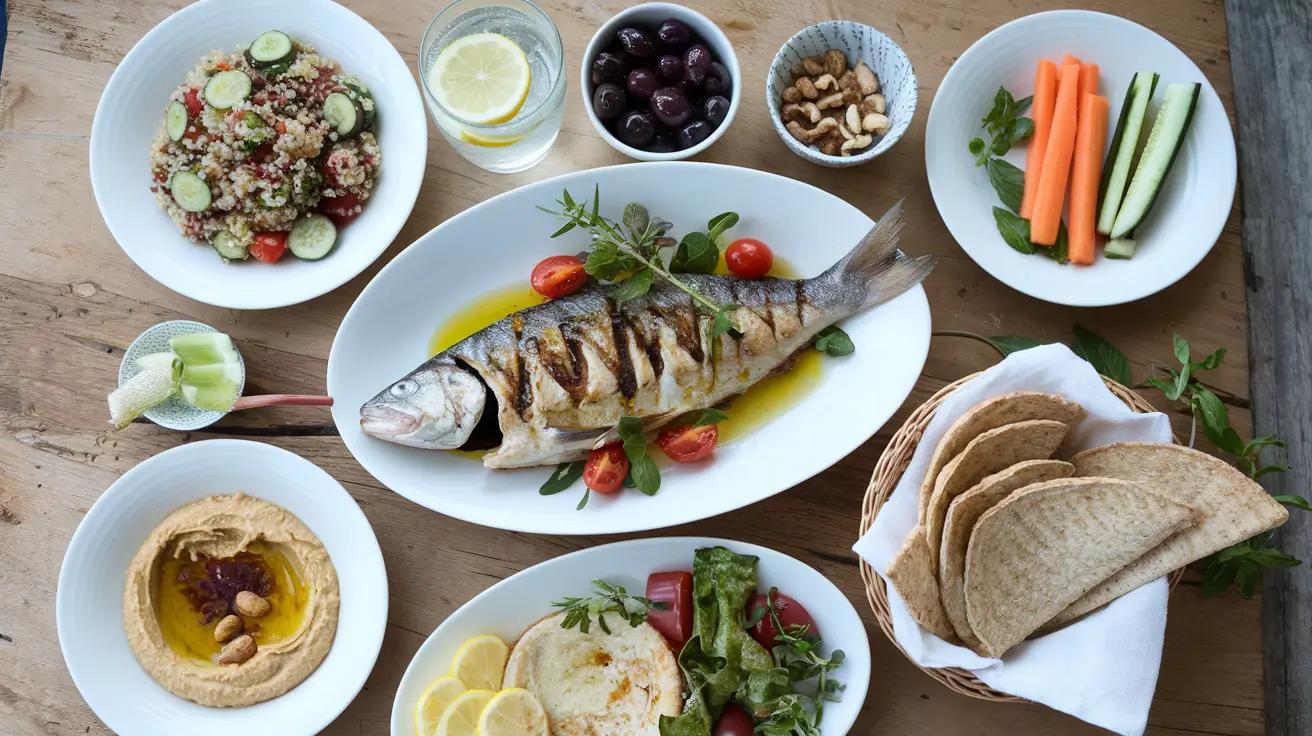The Mediterranean Diet: A Comprehensive Guide to Healthy Eating and Living (Alcohol-Free and Pork-Free Version)

The Mediterranean diet has long been celebrated as one of the healthiest eating patterns in the world. Inspired by the traditional eating habits of people in countries bordering the Mediterranean Sea, this diet is not just about food—it’s a lifestyle that combines delicious, nutritious eating with an active, social approach to living. In this comprehensive guide, we’ll explore the principles, benefits, and practical aspects of adopting a Mediterranean diet, with a focus on an alcohol-free and pork-free approach. We’ll also provide a detailed meal plan to help you get started on your journey to better health.
What is the Mediterranean Diet?
The Mediterranean diet is a way of eating based on the traditional cuisine of countries bordering the Mediterranean Sea. While there is no single definition of the Mediterranean diet, it is typically high in vegetables, fruits, whole grains, beans, nuts and seeds, and olive oil. This eating pattern has gained worldwide recognition for its potential to promote longevity and reduce the risk of various chronic diseases.
Key Components of the Mediterranean Diet (Alcohol-Free and Pork-Free Version)
- Abundant plant foods: Vegetables, fruits, whole grains, legumes, nuts, and seeds form the foundation of the diet. These foods provide essential vitamins, minerals, and fiber.
- Olive oil as the primary source of added fat: This heart-healthy oil replaces butter and margarine in cooking and as a condiment. It’s rich in monounsaturated fats and antioxidants.
- Moderate amounts of fish and seafood: Consumed at least twice a week, these provide essential omega-3 fatty acids, which are crucial for heart and brain health.
- Moderate amounts of dairy: Primarily cheese and yogurt, often in fermented forms. These provide calcium and beneficial probiotics.
- Limited red meat: Consumed sparingly, often for special occasions. In this version, pork is excluded. When consumed, opt for lean cuts of beef or lamb.
- Poultry and eggs: Consumed in moderation, these provide high-quality protein.
- Fresh fruit as dessert: Sweets are typically saved for special occasions. Fresh fruit offers a naturally sweet ending to meals.
- Alcohol-free beverages: Water is the primary drink, with unsweetened tea and coffee as alternatives. This version of the diet excludes alcohol, focusing on hydration through other means.
The Science Behind the Mediterranean Diet
The Mediterranean diet has been the subject of numerous scientific studies, consistently showing its benefits for overall health and longevity. Let’s delve into some of the key areas where research has demonstrated the diet’s positive effects.
Cardiovascular Health
One of the most well-established benefits of the Mediterranean diet is its positive impact on heart health. A landmark study published in the New England Journal of Medicine in 2013, known as the PREDIMED study, found that participants following a Mediterranean diet supplemented with extra-virgin olive oil or nuts had a significantly lower risk of cardiovascular events compared to those on a low-fat diet.
The diet’s heart-protective effects are attributed to several factors:
- High in monounsaturated fats: Primarily from olive oil, these fats help reduce LDL (bad) cholesterol while maintaining or increasing HDL (good) cholesterol.
- Rich in omega-3 fatty acids: From fish and nuts, these fats have anti-inflammatory properties and can help lower triglycerides.
- Abundant in antioxidants: From fruits and vegetables, these compounds help prevent oxidative stress and inflammation in blood vessels.
Weight Management
Despite being relatively high in fat, the Mediterranean diet has been shown to be effective for weight loss and maintenance. A 2008 study published in the New England Journal of Medicine found that participants following a Mediterranean diet lost more weight than those on a low-fat diet and maintained their weight loss better over a two-year period.
The diet’s effectiveness for weight management may be due to:
- High fiber content: Fiber-rich foods promote satiety and help control appetite.
- Emphasis on whole foods: Minimally processed foods are generally less calorie-dense and more nutrient-dense.
- Moderate portion sizes: The diet encourages mindful eating and enjoying meals in a relaxed setting.
Diabetes Prevention and Management
The Mediterranean diet has shown promise in both preventing and managing type 2 diabetes. A meta-analysis published in the British Medical Journal in 2008 found that greater adherence to a Mediterranean diet was associated with a significant reduction in the risk of developing type 2 diabetes.
For those already diagnosed with diabetes, the diet can help improve glycemic control. A study published in the Annals of Internal Medicine in 2009 showed that participants with newly diagnosed type 2 diabetes who followed a Mediterranean diet had better glycemic control and were less likely to need diabetes medications compared to those following a low-fat diet.
Cognitive Health
Emerging research suggests that the Mediterranean diet may have neuroprotective effects, potentially reducing the risk of cognitive decline and neurodegenerative diseases like Alzheimer’s. A study published in the Journal of the American Medical Association in 2009 found that higher adherence to the Mediterranean diet was associated with slower cognitive decline in older adults.
The diet’s brain-boosting effects may be due to:
- Anti-inflammatory properties: Chronic inflammation is linked to cognitive decline.
- Rich in antioxidants: These compounds help protect brain cells from oxidative stress.
- Healthy fats: Essential for brain function and the production of neurotransmitters.
Cancer Prevention
While more research is needed, some studies suggest that the Mediterranean diet may help reduce the risk of certain types of cancer. A review published in the European Journal of Cancer Prevention in 2013 found that adherence to the Mediterranean diet was associated with a reduced risk of overall cancer mortality, as well as a reduced risk of several specific types of cancer.
The diet’s potential cancer-protective effects may be attributed to:
- High intake of plant-based foods: Rich in phytochemicals and antioxidants that may help prevent cell damage.
- Limited red meat consumption: High intake of red and processed meats has been linked to increased cancer risk.
- Emphasis on whole, unprocessed foods: These foods retain more of their natural protective compounds.
Implementing the Mediterranean Diet: Practical Tips
Adopting the Mediterranean diet doesn’t have to be complicated. Here are some practical tips to help you incorporate Mediterranean-style eating into your daily life:
- Make vegetables the star: Aim to fill half your plate with vegetables at each meal. Experiment with different cooking methods like roasting, grilling, or sautéing in olive oil.
- Choose whole grains: Replace refined grains with whole grain options like whole wheat bread, brown rice, quinoa, and whole grain pasta.
- Snack on nuts and seeds: Keep a variety of unsalted nuts and seeds on hand for quick, nutritious snacks.
- Use herbs and spices: Enhance flavor without adding salt by using herbs and spices generously in your cooking.
- Eat more fish: Aim for at least two servings of fish per week. Choose fatty fish like salmon, sardines, or mackerel for their omega-3 content.
- Limit red meat: Reduce red meat consumption to no more than a few times per month. Choose lean cuts when you do eat red meat. Remember, this version excludes pork.
- Enjoy fruit for dessert: Satisfy your sweet tooth with fresh fruit instead of processed sweets.
- Cook with olive oil: Use extra virgin olive oil as your primary cooking fat and for dressing salads.
- Practice mindful eating: Take time to enjoy your meals, preferably with others. Eat slowly and savor each bite.
- Stay hydrated: Make water your primary beverage. Enjoy unsweetened tea or coffee if desired.
7-Day Mediterranean Diet Meal Plan (Alcohol-Free and Pork-Free)
To help you get started with the Mediterranean diet, here’s a sample 7-day meal plan. Remember, this is just a guide – feel free to adjust portions and swap ingredients based on your preferences and nutritional needs.
Day 1
Breakfast: Greek yogurt topped with honey, walnuts, and fresh berries; Whole grain toast with a drizzle of olive oil
Lunch: Lentil and vegetable soup; Whole grain pita bread; Small Greek salad (tomatoes, cucumbers, olives, feta cheese, olive oil dressing)
Dinner: Grilled salmon with lemon and herbs; Quinoa pilaf with roasted vegetables; Steamed broccoli with garlic and olive oil
Snack: Fresh apple slices with almond butter
Day 2
Breakfast: Whole grain toast with mashed avocado and sliced tomatoes; Boiled egg
Lunch: Chickpea and tuna salad with olive oil, lemon juice, and herbs; Mixed green salad; Whole wheat pita chips
Dinner: Grilled chicken souvlaki skewers; Tzatziki sauce; Brown rice; Roasted Mediterranean vegetables (zucchini, eggplant, bell peppers)
Snack: Handful of mixed nuts (almonds, walnuts, pistachios)
Day 3
Breakfast: Oatmeal cooked with milk, topped with sliced figs and a drizzle of honey; Orange slices
Lunch: Whole grain wrap with hummus, falafel, lettuce, tomato, and cucumber; Greek yogurt
Dinner: Baked cod with tomatoes, olives, and capers; Roasted sweet potato wedges; Sautéed spinach with garlic
Snack: Carrot sticks with hummus
Day 4
Breakfast: Whole grain toast with ricotta cheese and sliced pears; Handful of walnuts
Lunch: Mediterranean pasta salad (whole wheat pasta, cherry tomatoes, olives, feta cheese, cucumbers, olive oil dressing); Fresh peach
Dinner: Grilled vegetable and halloumi cheese skewers; Tabbouleh salad; Whole grain pita bread
Snack: Greek yogurt with a drizzle of honey
Day 5
Breakfast: Vegetable frittata with zucchini, tomatoes, and feta cheese; Whole grain toast
Lunch: Grilled vegetable and mozzarella panini on whole grain bread; Mixed green salad with olive oil and lemon dressing
Dinner: Baked chicken with herbs, lemon, and olive oil; Roasted Mediterranean vegetables; Bulgur wheat pilaf
Snack: Fresh berries with a small handful of almonds
Day 6
Breakfast: Whole grain cereal with milk, topped with sliced banana and a sprinkle of cinnamon; Greek yogurt
Lunch: Lentil and vegetable salad with feta cheese; Whole grain crackers; Fresh orange
Dinner: Grilled shrimp skewers; Quinoa tabbouleh; Grilled zucchini and eggplant
Snack: Sliced bell peppers with hummus
Day 7
Breakfast: Whole grain toast with almond butter and sliced strawberries; Boiled egg
Lunch: Greek-style salad with grilled chicken, mixed greens, tomatoes, cucumbers, olives, and feta cheese; Whole grain roll
Dinner: Baked eggplant Parmesan (made with whole grain breadcrumbs and minimal cheese); Whole wheat spaghetti with tomato sauce; Steamed broccoli
Snack: Small handful of pistachios and dried apricots
Beverage Suggestions:
- Water (primary beverage)
- Unsweetened tea or coffee
- Sparkling water with a splash of 100% fruit juice
- Homemade lemonade sweetened with a small amount of honey
Potential Challenges and How to Overcome Them
While the Mediterranean diet offers numerous health benefits, transitioning to this eating pattern may present some challenges. Here are some common obstacles and strategies to overcome them:
- Cost concerns: Some may worry that fresh produce and fish are expensive.
- Solution: Buy seasonal produce, use frozen fruits and vegetables, and opt for canned fish when fresh is too costly.
- Time constraints: Preparing meals from scratch can be time-consuming.
- Solution: Batch cook on weekends, use a slow cooker, and keep quick Mediterranean-friendly snacks on hand.
- Dining out: It can be challenging to stick to the diet when eating out.
- Solution: Look for Mediterranean restaurants, or choose grilled fish or chicken with vegetable sides at other restaurants.
- Family preferences: Not everyone in the family may be on board with the diet change.
- Solution: Introduce changes gradually, involve family members in meal planning and preparation, and continue to serve some familiar favorites alongside new Mediterranean dishes.
- Cheese and dairy cravings: The diet recommends moderate dairy consumption, which may be difficult for cheese lovers.
- Solution: Focus on small amounts of flavorful cheeses like feta or Parmesan, and experiment with nut-based “cheese” alternatives.
- Beverage variety: While water is the primary beverage in this alcohol-free version of the Mediterranean diet, some may miss the variety.
- Solution: Experiment with flavored waters (infused with fruits or herbs), herbal teas (hot or iced), and occasional small amounts of 100% fruit juice mixed with sparkling water.
Mediterranean Diet and Sustainability
In addition to its health benefits, the Mediterranean diet is also recognized for its environmental sustainability. Here’s why:
- Plant-based focus: The diet emphasizes plant foods, which generally have a lower environmental impact than animal products.
- Seasonal and local produce: Traditional Mediterranean eating encourages consuming locally grown, seasonal fruits and vegetables, reducing transportation-related emissions.
- Limited red meat: The diet’s emphasis on fish and plant-based proteins over red meat aligns with recommendations for reducing the environmental impact of food production.
- Whole foods approach: By focusing on whole, minimally processed foods, the diet reduces energy use and packaging waste associated with highly processed foods.
- Food waste reduction: The Mediterranean lifestyle encourages using all parts of fruits and vegetables and repurposing leftovers, which can help reduce food waste.
Adapting the Mediterranean Diet for Special Dietary Needs
The Mediterranean diet can be adapted to suit various dietary needs and preferences. Here are some suggestions:
- Vegetarian/Vegan:
- Replace fish with plant-based protein sources like legumes, nuts, and seeds.
- Use plant-based milk alternatives in place of dairy.
- Ensure adequate intake of vitamin B12, iron, and omega-3 fatty acids through fortified foods or supplements.
- Gluten-free:
- Choose gluten-free whole grains like quinoa, brown rice, and millet.
- Use gluten-free oats for breakfast cereals.
- Be cautious with processed gluten-free products, as they may be less nutritious than whole food alternatives.
- Low-FODMAP:
- Choose low-FODMAP fruits and vegetables.
- Use garlic-infused oil instead of garlic cloves.
- Limit or avoid onions, and replace with chives or the green parts of spring onions.
- Choose lactose-free dairy products or plant-based alternatives.
- Diabetes-friendly:
- Focus on low glycemic index carbohydrates.
- Pair carbohydrates with protein and healthy fats to help manage blood sugar levels.
- Monitor portion sizes, especially with fruits and grains.
- Alcohol-free and pork-free:
- Replace wine in cooking with vegetable or chicken broth, or grape juice in small amounts.
- Use herbs and spices to add flavor complexity traditionally provided by wine in some dishes.
- Replace pork with other lean meats like chicken or turkey, or plant-based proteins like legumes or tofu.
The Mediterranean Lifestyle: Beyond Diet
While food is a crucial component of the Mediterranean diet, it’s important to note that the health benefits associated with this eating pattern are part of a broader lifestyle approach. Other key aspects of the Mediterranean lifestyle include:
- Regular physical activity: Engage in moderate exercise daily, such as brisk walking, swimming, or cycling.
- Social connections: Enjoy meals with family and friends. Social eating is an integral part of the Mediterranean lifestyle.
- Mindful eating: Take time to savor your meals, eat slowly, and pay attention to hunger and fullness cues.
- Adequate rest: Prioritize getting enough sleep and consider incorporating short daytime naps (siestas) if possible.
- Stress management: Practice stress-reducing activities like meditation, yoga, or spending time in nature.
- Sustainable practices: Support local farmers and fishers, and try to reduce food waste.
By adopting these lifestyle factors along with the dietary principles, you can maximize the potential health benefits of the Mediterranean approach.
Conclusion
The Mediterranean diet, even in its alcohol-free and pork-free version, offers a delicious and nutritious way of eating that has been associated with numerous health benefits. From cardiovascular protection to weight management and potential cognitive benefits, this dietary pattern has stood the test of time and scientific scrutiny.
Remember, transitioning to a new way of eating is a journey. Start with small changes, experiment with new recipes and ingredients, and gradually incorporate more Mediterranean principles into your daily life. The key is to find a sustainable approach that you enjoy and can maintain long-term.
As with any significant dietary change, it’s always a good idea to consult with a healthcare professional or registered dietitian, especially if you have existing health conditions or specific nutritional needs.
Embrace the flavors, textures, and variety of Mediterranean cuisine, and enjoy the journey towards a healthier, more balanced lifestyle. Bon appétit, or as they say in the Mediterranean, “Kali orexi!”




